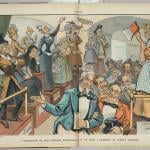Nathan Kerr ( Christ, History, Apocalyptic ) explains Yoder’s notion of Jesus’ “independence” by saying that Jesus “lives, concretely and in history, a life-story that is entirely free from and irreducible to any pre-given ‘historical’ coordinates, any general or ‘meta’ principle that might serve to range the complexities and contingencies of history within any universalizable scope or logic.” It also indicates how “his apocalyptic historicity happens concomitantly as the intensification and transformation of the historically contingent as such.” Perhaps I’ve... Read more















